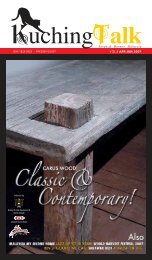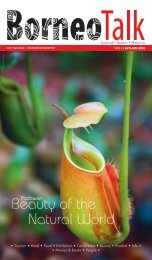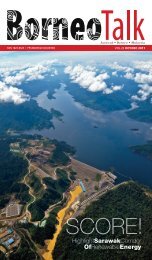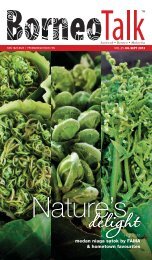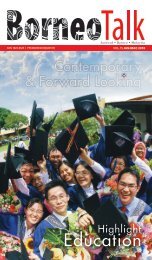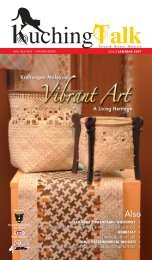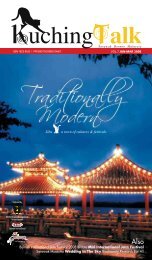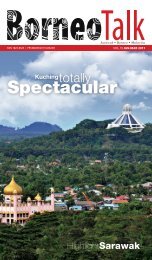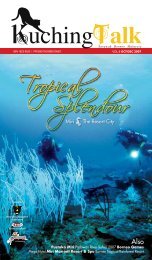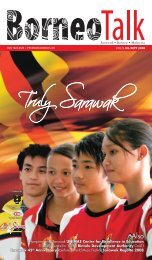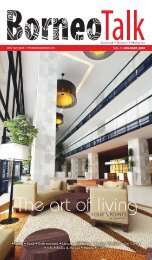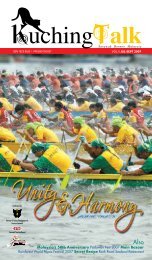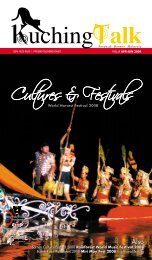Highlight a place to call home - BorneoTalk Official Website
Highlight a place to call home - BorneoTalk Official Website
Highlight a place to call home - BorneoTalk Official Website
- No tags were found...
You also want an ePaper? Increase the reach of your titles
YUMPU automatically turns print PDFs into web optimized ePapers that Google loves.
Education<br />
(left <strong>to</strong> right) Assoc. Prof Dr<br />
M.A Affan, Assoc. Prof Dr<br />
Zainab Ngaini and Senior<br />
Lecturer Dr Ho Wei Seng<br />
At UNIMAS (University Malaysia<br />
Sarawak) they have successfully<br />
developed a kit, which can do exactly<br />
what the industries are looking for in<br />
the field of amplifying DNA via PCR<br />
without prior DNA purification. Aptly<br />
<strong>call</strong>ed a fasTiP-X Kit, the machine<br />
simplifies the process while also<br />
saves cost and time. It also does not<br />
use liquid nitrogen nor hazardous<br />
chemicals and therefore suitable for<br />
high-throughput of genome analyses.<br />
DNA<br />
extraction<br />
of plant samples<br />
Researcher: Dr Ho Wei Seng<br />
It is a fact that majority of people<br />
in this world do not know<br />
anything about DNA extraction of<br />
plant samples nor the process of<br />
identifying compounds and other<br />
plant content in the samples. To<br />
those in the research industry like<br />
forestry, biological and herbal<br />
labora<strong>to</strong>ries, fac<strong>to</strong>ries and chemistry,<br />
such information is vital for their<br />
work. As such, the faster these<br />
simple extractions can be done and<br />
results produced, the better it will<br />
be for them <strong>to</strong> move in<strong>to</strong> the next<br />
step or stage of research on the<br />
materials.<br />
With the new device, there are only<br />
three simple steps. Firstly, transfer the<br />
plant samples in<strong>to</strong> the fasTip-X Extract<br />
Buffer by <strong>to</strong>uching the samples with a<br />
Harris Uni-core puncher. Next, incubate<br />
<strong>to</strong> lyses the plant cells and finally use<br />
the incubated solution for polymerase<br />
Chain Reaction (PCR) amplification.<br />
As can be seen the whole process<br />
is simple and easy for anyone with<br />
competent <strong>to</strong> handle. The time fac<strong>to</strong>r<br />
is important in the processing as results<br />
can be gathered in a short time and<br />
also very minimum sample material is<br />
required. The sample can be amplified<br />
>3 kb and works with many varieties<br />
of plant samples. It is also obvious that<br />
the process is safe as no hazardous<br />
chemicals are used. Most importantly,<br />
the device is cost effective and the<br />
difference could be as much as US$7<br />
when compared <strong>to</strong> conventional<br />
extraction methods per sample.<br />
For better and closer look in<strong>to</strong><br />
these new findings at UNIMAS,<br />
prospective inves<strong>to</strong>rs and businesses<br />
should directly consult the university<br />
and work in collaboration with<br />
them. After all, what is good for<br />
the research team will eventually<br />
be useful and cost effective for the<br />
industries in the long run.<br />
Faculty of Resource Science<br />
and Technology<br />
Universiti Malaysia Sarawak<br />
94300 Kota Samarahan, Sarawak, Malaysia.<br />
Tel: +6082 583161 Fax: +6082 583160<br />
www.unimas.my<br />
Apr-Jun2012<strong>BorneoTalk</strong> | 65



